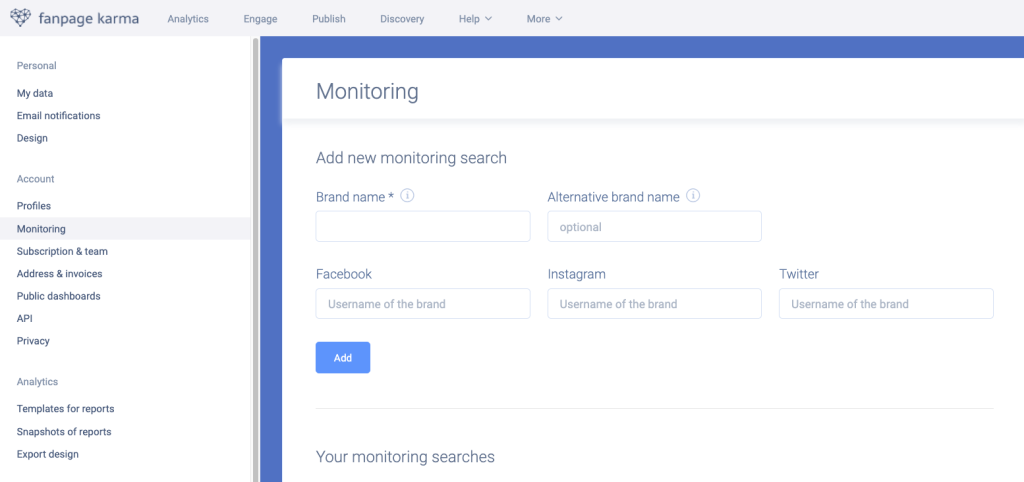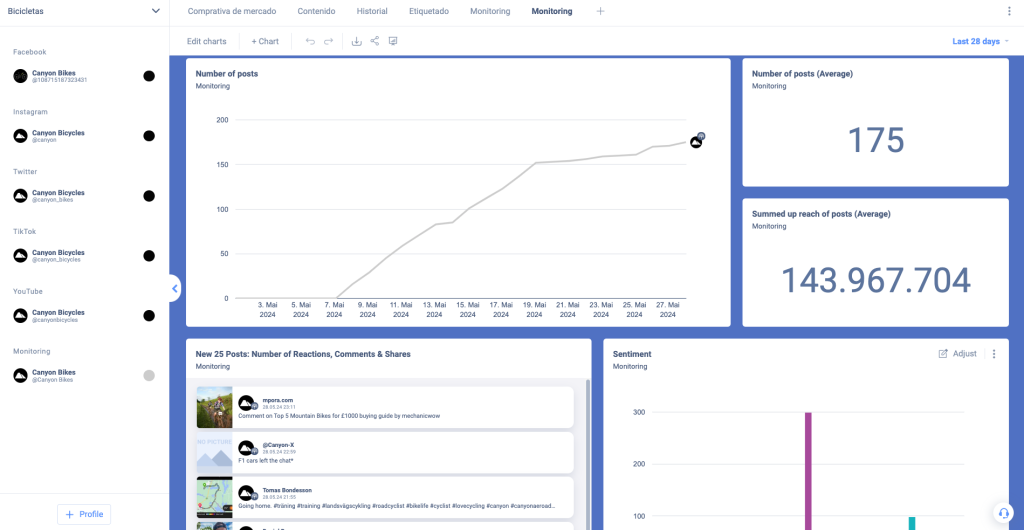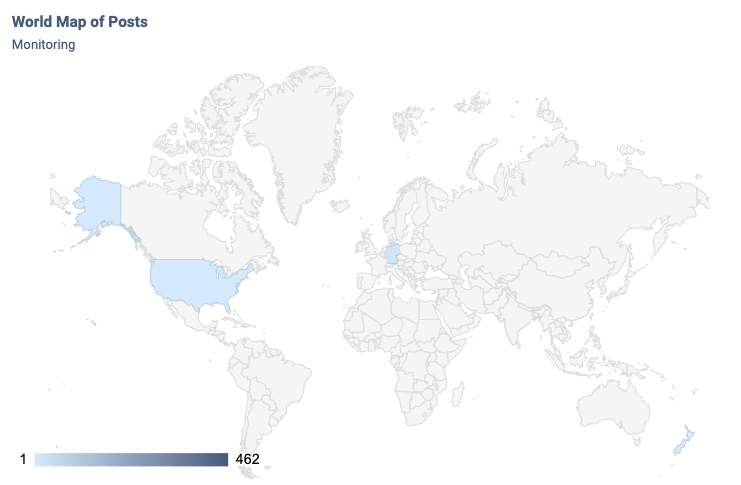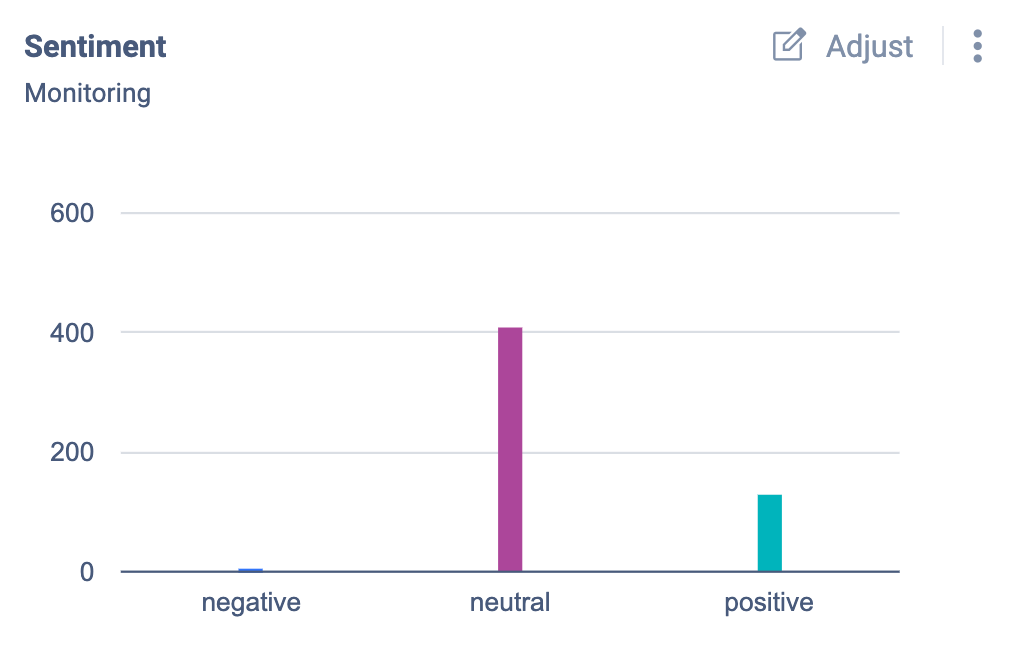Social Media Monitoring Tools

Social media monitoring is an increasingly important approach used by different businesses to understand what is being said about their brand or business online. For this reason, many businesses are searching for the right social media monitoring tool that allows them to monitor what is being said about them on social media. But what are the essential features that the best social media monitoring tools would have, and how do you know which one is right for your business?
In this article, we will go through what you need to be on the lookout for when looking for social media monitoring solutions. Unfortunately, there appears to be some misunderstandings out there about what social media monitoring really is and how it should be done. There may be different tools that claim to do social media monitoring while not making clear what this really means.
But don’t worry, we will explain what you should look for so you can get the social media monitoring tool that fits your needs.
What is Social Media Monitoring?
Before getting into what you should look for in a social media monitoring tool, we should define what social media monitoring actually is, since some may confuse it with other aspects of social media management. Social media monitoring is the process of tracking and recording mentions of your brand across different social media channels. In other words, social media monitoring allows you to know what people are saying about your brand, or business.
This process is essential to better understand public perception, manage online reputation, identify trends and opportunities, and improve interaction with target audiences. Here are some key aspects of social media monitoring:
Mention tracking: Involves searching for and collecting all mentions of a brand on social networks such as Facebook, Twitter, Instagram, or the internet in general, among others.
Sentiment analysis: Assessing the tone of mentions (positive, negative, or neutral) to understand the public’s perception of the brand or topic.
Trend identification: Detecting patterns and emerging trends in online conversations that may affect the brand or be relevant to the business.
Competitor analysis: Observing and analyzing what is being said about competitors to identify comparative strengths and weaknesses.
Performance measurement: Using metrics and key performance indicators (KPIs) to evaluate the effectiveness of social media strategies and adjust tactics as needed.
Crisis management: Detecting and managing critical situations quickly before they become major problems for the brand.
In short, social media monitoring is a vital tool for any digital marketing strategy, as it allows companies to stay informed about what is happening in their digital environment, react appropriately, and plan future actions based on concrete data.
Importantly, a tool for monitoring social media would track comments or mentions of your brand or business, even when someone doesn’t tag your business or reply directly to one of your posts. When monitoring social media accounts where your brand may be mentioned, it is essential to ensure that you know what your audience thinks about your business.

Why is Social Media Monitoring Important?
Monitoring social networks is essential for several strategic and operational reasons. Most of all, this includes knowing what is being said about your brand or business. For this reason, social media monitoring tools are designed in order to help find out what is being said as well as give you insights to help to analyze the data output.
Here are some of the core areas where social media monitoring software can help you and your business:
1. Reputation Management:
- Early detection of problems: Allows you to identify negative mentions or potential crises quickly to take corrective actions before things escalate.
- Improving perception: Helps manage public perception of the brand, as well as responding to comments and criticisms effectively.
2. Customer Insight:
- Understand needs and wants: Analyze what customers are saying to tailor products, services, and marketing strategies in order to meet their needs and expectations.
- Influencer identification: Find influencers who can help promote the brand.
3. Competitiveness:
- Competitive analysis: Monitor what is being said about your competitors to identify opportunities or areas where you are falling behind.
- Benchmarking: Compare your brand’s performance with your competition and to identify areas for improvement.
4. Product and Service Improvement:
- Direct Feedback: Receive direct feedback from users on products and services.
- Innovation: Identify emerging trends and needs that can help you come up with new ideas and products.
5. Marketing Effectiveness:
- Impact measurement: Better evaluate and analyze marketing campaigns.
- Content optimization: Understand what type of content resonates with your audience to better assess its performance.
6. Customer Relationship:
- Improved customer service: Respond quickly to customer inquiries and issues so you can improve customer experience and satisfaction.
- Loyalty: Create a strong relationship with customers through more targeted interactions.
7. Data-Driven Decision-Making:
- Actionable Insights: Provides data and analytics that can help you develop better strategies.
- Trend prediction: Better detect market changes so you can adapt or change your overall strategies.
In short, social media monitoring is crucial to keep a brand relevant, competitive, and in tune with its audience. It enables a proactive and well-informed response to the ever-changing dynamics of the digital environment, strengthening the brand’s position in the market.
Is there a Difference Between Social Media Listening and Monitoring Tools?
Social media listening and monitoring tools are often talked about together but are, in reality, two different things. Social media monitoring, as we have seen above, is geared toward knowing what people are saying about your brand, product(s), or business.
Social media listening tools are designed to help you to understand, or listen to, the various topics or issues being talked about in a particular industry or among a specific audience. It does not concern your brand or business directly, but it can give you an idea about what the trending topics for an industry are and detect pain points and questions that your target audience has. As we will discuss below, social media monitoring can include insights that may provide you with some of the information that you would get with social media listening. However, the extent of these insights may not be as extensive as if you used a social media listening tool alongside a social media monitoring tool.
A Word of Warning: Make Sure You are Actually Buying a Social Media Monitoring Tool!
There may be some social media tools out there that claim to include social media monitoring features. As a rule, you should always take a hard look into what these monitoring tools for social media are actually offering.
Let’s talk about a concrete example. There may be some social media tools that claim to offer social media monitoring, since they notify you when someone replies or reacts to one of your posts. However, this has more to do with community management than social media monitoring. In fact, many social media platforms themselves tell you when someone responds to a post or tags you, and the value of a social media tool in this case is simply to help you manage all social media channels in one place. However, this does not help you actively monitor your brand or business across other profiles or when you are not tagged in posts. This is a much more extensive task that takes a tool with more capabilities.
As the above example shows, some tools might claim to offer social media monitoring when, in reality, it is simply a community management function. For this reason, we want to go over what you should look for so you don’t make the mistake of buying a tool that is not offering you the functions you need.

Features of the Best Social Media Monitoring Tools
When you are looking for effective social media monitoring solutions for your business, you should investigate what the tool actually offers. Below, we will highlight the 4 key features of social media monitoring software that you should look for when you are shopping for your tool. Please note that the screenshots below are from the social media monitoring function of the Fanpage Karma social media tool.
Brand/Company Tracking for the Social Media Channels you Need
When looking through different social media monitoring tools, you need to ensure that you can effectively track your chosen keywords throughout the platform. Remember, you don’t necessarily need a tool that notifies you when someone comments on your own posts or tags your brand or business in a post or a comment. Rather, your social media monitoring tool should help you find mentions of your business or brand in other people’s posts, even when your business or brand is not tagged.
Generally, you should be able to specify your brand or company name as well as identity what social media networks you want covered.

What might surprise you is that some social media tools may not provide you with true monitoring capabilities for every single social media channel. Therefore, when reviewing social media monitoring tools, you should confirm that, at a minimum, they allow you to track specific social media channels. For instance, if you absolutely need a social media monitoring tool for a platform such as Facebook, then make sure the tool you are looking at explicitly says Facebook monitoring is included.
You should also be on the lookout for a social media monitoring tool that can help you track various keywords being used in posts that appear in your monitoring report. This can be an effective way to gain more customer or target audience insights by helping you detect the topics they are discussing.

Webpage Tracking
You might be thinking that tracking comments or mentions of your brand outside social media doesn’t have to be part of a social media monitoring tool. After all, we are talking about monitoring on social media channels. However, not all of your mentions or discussion about your business or brand will be conducted on social media.
The ability to combine mentions and comments from sources outside of social media channels is crucial for effective brand monitoring. For this reason, the best social media monitoring tools should allow you to track various keywords on different web pages in addition to the social media platforms that you need. This way, you can be sure that you are getting a comprehensive overview of where and when your brand or business is being mentioned online.

Social Media Metrics Dashboard and Analytics Features
Compiling data is one challenge when it comes to social media monitoring. However, once data is collected, it is helpful to effectively analyze it. With social media monitoring, you will probably be working with a large data set of various mentions of your brand or business across social media and web pages.
On the most basic level, this means having a clear and functional social media metrics dashboard that gives you an overview of everything you need to know. A dashboard should provide you with various metrics such as the number of posts that mention your business or brand in a give time period as well as the average reach of those posts. You would also likely want to see a list of the posts with the highest number of reactions in order to understand what posts are gaining the most attention.

Good dashboards will also enable real-time social media monitoring, which is essential to make sure you see where your company is being mentioned and whether or not you need to react to it. Social media monitoring and analysis tools can also give you a leg up on understanding where mentions and posts are coming from. These types of insights can give you a much more targeted analysis of different markets and audiences.

Sentiment Analysis Capability
When discussing monitoring features in conjunction with social media tools, you may hear about sentiment analysis. Sentiment analysis can take your monitoring to the next level since it focuses not just on if, or how often, people are mentioning your business or brand, but whether the mention is positive, negative, or neutral.
Sentiment analysis can be extremely helpful when dealing with a high number of mentions of your company since it can give you a broad understanding of how people speak about your brand. While you shouldn’t rely exclusively on sentiment analysis to determine how people feel about your business or brand, but it can be a helpful approach to understand the overall opinion of your brand or business on a broad level. As you can see below in the sample screenshot, a sentimental analysis presented in a simple graph can give you instant insight into how people are talking about your brand or business.

Limitations of Social Media Monitoring Tools
Despite the many benefits of social media monitoring, your social media monitoring tool may have some limitations. At the end of the day, it is extremely difficult to collect and analyze every comment on social media with 100% accuracy. Below are some important points to keep in mind when it comes to understanding the limitations of and challenges surrounding social media monitoring.
1. Volume of data:
- Large Data Sets: There is a large amount of data generated on social networks, and this can make it difficult to identify relevant and actionable information.
- Message Filtering: It may be difficult for some social media monitoring tools to filter through messages that are relevant and those that are not.
2. Accuracy of sentiment analysis:
- Ambiguity and context: Sentiment analysis features may have difficulty interpreting the tone and context of messages, especially when sarcasm, irony, or colloquial language is involved.
- Multilingualism: Sentiment analysis may be less accurate for different languages or dialects. Additionally, not all languages may be supported by social media monitoring tools.
3. Limited coverage:
- Private platforms: Mentions on private groups (such as certain Facebook groups) may not be covered by social media monitoring tools.
- Unstructured data: Mentions or comments in the form of images, videos, or memes may not be picked up by social media monitoring tools.
4. Resource intensive:
- Time and resource intensive: Implementing and maintaining an effective social media monitoring platform normally requires some time and attention.
- Manual analysis: There may be a need for constant review of the monitoring data to ensure that your analysis is accurate.
5. Constant evolution of platforms:
- Changes to Social Media Algorithms: Social media networks may alter their algorithms, which may affect the performance of social media monitoring tools.
- New social networks: New or emerging social media networks may not be covered by social media monitoring software.
6. Interpretive results:
- Interpretive Difference: There can be conflicting interpretations of social media data, and conclusions may vary depending on the method of analysis.
- Weighting Biases: Some social media monitoring tools may give more weight or preference to certain networks.
Social media monitoring can be an indispensable tool for your business. However, it is important to be aware of its limitations and use it in conjunction with other forms of social media research and analysis. Keep in mind, there is generally no guarantee that your social media monitoring tool will catch every mention. There will always be limitations in terms of coverage and accuracy within the fast changing world of social media.
Finding the Right Social Media Monitoring Tool
Remember, it is essential to make sure that your social media tool actually does social media monitoring rather than community management or other simply tasks you can do with a simple social media management tool. Social media monitoring requires a tool that is designed specifically to find mentions and comments that are not happening on your social media profiles.
If you are looking for a social media tool that provides advanced social media monitoring capabilities, then you are in luck. Fanpage Karma has developed an effective social media monitoring tool that helps you keep an eye on comments related to your brand and/or company. In addition to monitoring functions, Fanpage Karma offers benchmarking, community management, research, and publishing features. You can try out Fanpage Karma’s free 14-day trial today.
To access the monitoring section of Fanpage Karma, you must have at least the Gold plan and purchase a monitoring plans S, M or L. You can review our pricing and plans here: https://www.fanpagekarma.com/plans.
You can also sign-up for the free weekly webinar to find out how social media management tools can improve your social media performance.









